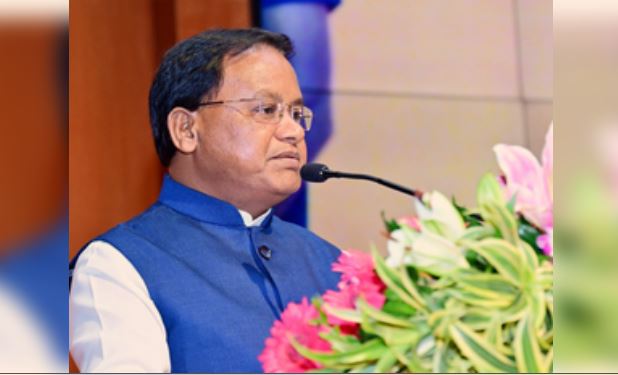Bhubaneswar: Taking a pledge to build a prosperous Odisha, Chief Minister Mohan Charan Majhi Tuesday said that ‘Odia Asmita’ (pride), high ambition and tireless efforts will be the three pillars of his government to carry forward the state.
Majhi said this while addressing the state-level ‘Odisha Dibasa’ function held at Satyabhamapur village in the Cuttack district, the birthplace of Utkal Gourav Madhusudan Das, one of the architects behind the formation of a separate Odisha state on April 1, 1936.
The Day is observed to remember the struggle for the formation of a separate state and to save its unique language, culture and tradition.
The ruling BJP, which won the 2024 state Assembly elections on a campaign centred around Odia Asmita (pride), took the state-level Odisha Dibasa celebration function outside Bhubaneswar and organised it at Satyabhamapur village in Cuttack district.
The CM called Satyabhamapur village a “sacred pilgrimage site” for Odias and announced plans to transform it into a hub of Odia nationalism.
“We are celebrating Odisha Day on the birth soil of Utkala Gourav, honouring the transformation brought by people with a focus on Odia Asmita,” Majhi said after laying the foundation stone for the “Integrated Development of Madhusudan Das’s Birthplace” project, to be developed at an investment of Rs 21 crore.
Madhusudan Das’s birthplace will be developed with an interpretation centre, a renovated ancestral home (Entudishala), a statue, a guest house, a library, and a light-and-sound system at a nearby water body.
“We cannot repay the debt of our great sons of the soil and their sacrifice. But we can meet their dreams of building a prosperous Odisha. Odia Asmita, high ambitions and tireless efforts to be the pillars on which the prosperous Odisha will be built,” the chief minister said.
Earlier in the day, President Droupadi Murmu, Prime Minister Narendra Modi, Vice President Jagdeep Dhankar, Odisha Governor Haribabu Kambhampati, Leader of Opposition in Odisha Assembly Naveen Patnaik and many other dignitaries greeted the people of Odisha on the occasion.
Murmu, who hails from the state, said, “It is an occasion to celebrate the rich cultural heritage of Odisha and the remarkable contribution of its people in various fields. The warm and hospitable people of Odisha have worked hard for the progress of the state while preserving its glorious traditions.”
“Odisha has played an important role in the freedom struggle and produced several makers of modern India. I pray to Mahaprabhu Jagannath for peace and prosperity of Odisha,” she added.
Modi said India takes pride in Odisha’s history, literature and music. “Warm wishes on Utkala Dibasa! This day is a fitting tribute to Odisha’s glorious culture. India takes pride in Odisha’s history, literature and music. Odisha’s people are hardworking and have excelled in diverse fields. Over the last year, the Centre and Odisha governments are working extensively to further the state’s progress,” he posted on X.
The chief minister called upon the 4.5 crore people of Odisha to unite in this transformative journey and said that no force could halt their collective resolve. He also outlined ambitious economic goals: a 500 billion USD economy by 2036, Odisha’s centennial, and a 1.5 trillion USD economy by 2047, positioning the state as a growth engine for a developed India.
Majhi also launched the ‘Odia Pakshya’ (fortnight) programme from April 1 to 14 and urged the people to embrace traditional Odia food, dress, language, and literature. “Odia identity flows in every drop of our blood. I am fond of ‘Pakhal’ (fermented rice) as an Odia. Our true wealth is our people,” he said.
Majhi also paid tributes to luminaries like Gopabandhu Dash, Parala king Krushnachandra Gajapati, Mayurbhanj Maharaja Ramachandra Bhanjkadeo, Pandit Godabaris Mishra, Gangadhar Meher, Fakir Mohan Senapati and others, who fought for Odisha’s linguistic and cultural awakening.
He also quoted Madhubabu’s stirring call —”Utha re Utha Utkala Santana, Uthibu tu kete dine, Puruba Gaurava Puruba Sahasa, Padiba ki kebe mane!” (Arise, arise, sons of Utkala, how long will you sleep, will the glory and courage of the past ever stir your mind).
Noting that the Odia language now enjoys the status of a classical language, Majhi said there was a time when this (Odia language) was not even accepted as a separate language.
The political situation during the British era kept Odisha in a miserable position, he said, adding that some parts of the Odia-speaking region were included in the Bengal Presidency, some in the Central Provinces, some areas in the south as part of the Madras Presidency, while some areas were merged with the Bihar-Odisha Province. As a result, Bengali, Hindi, and Telugu languages and culture were spreading in those areas instead of Odia, the chief minister said.
PTI






































